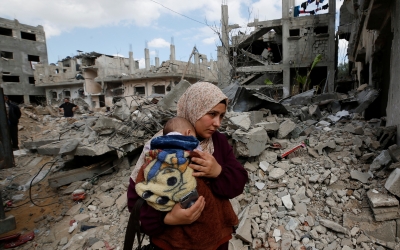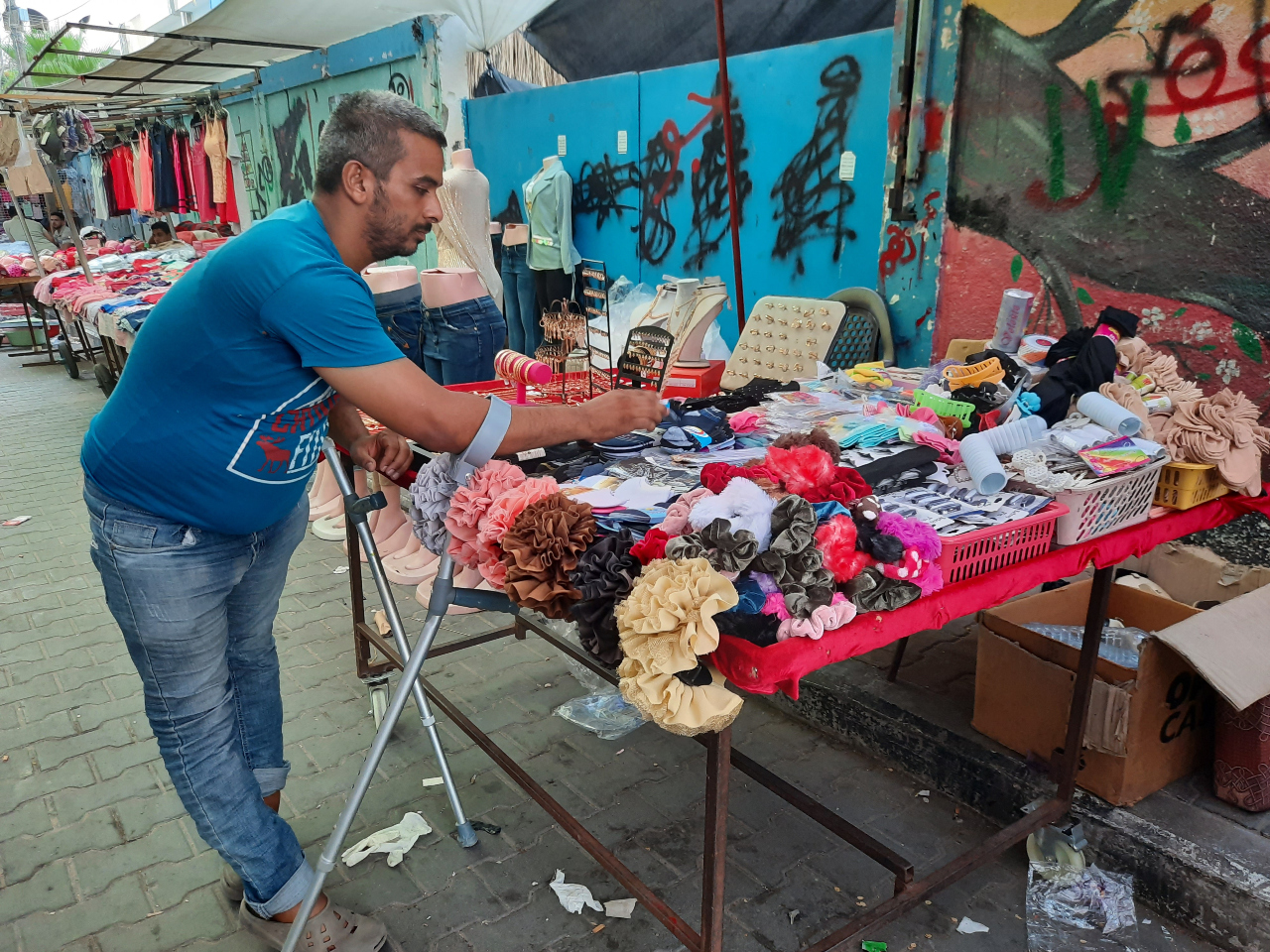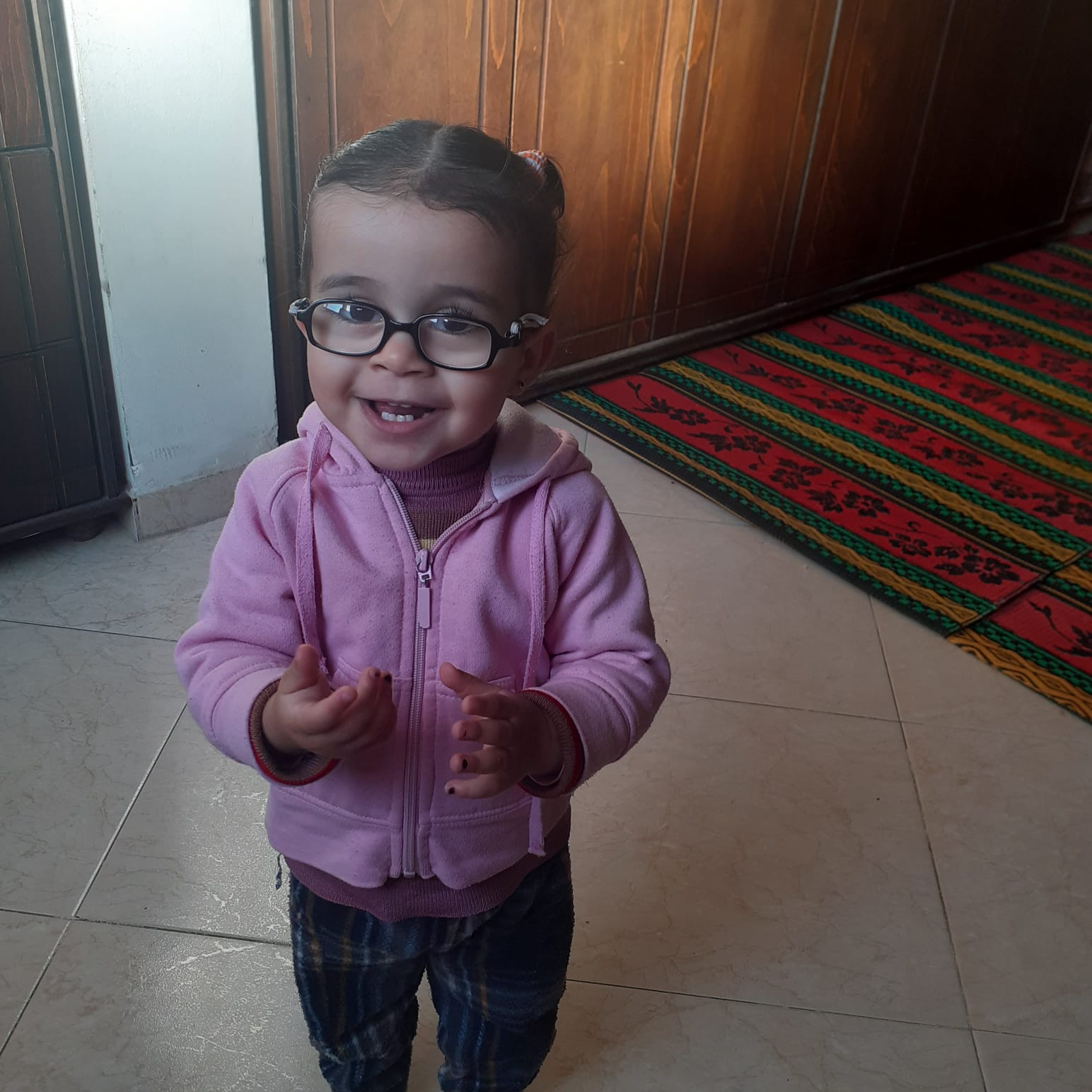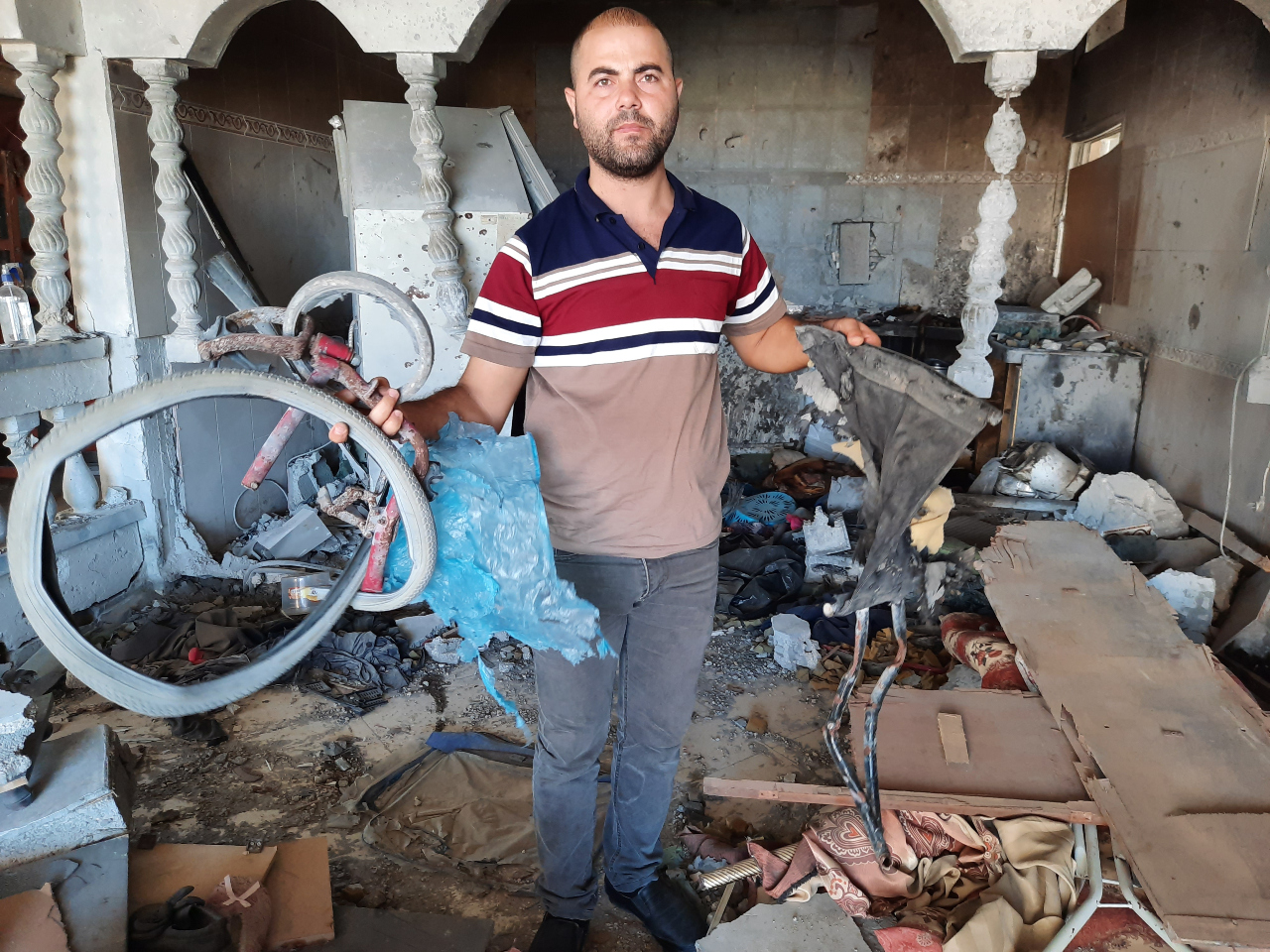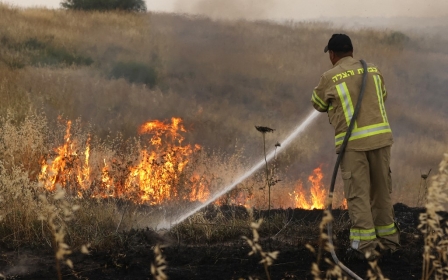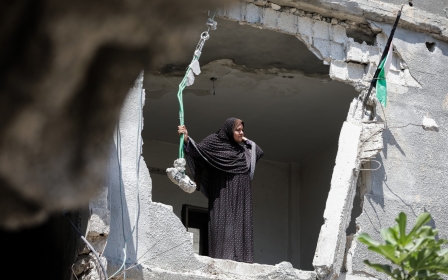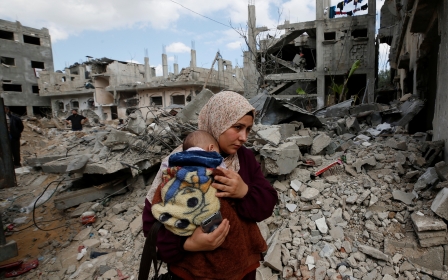Gaza: Palestinians with disabilities recount horror of Israel's May offensive
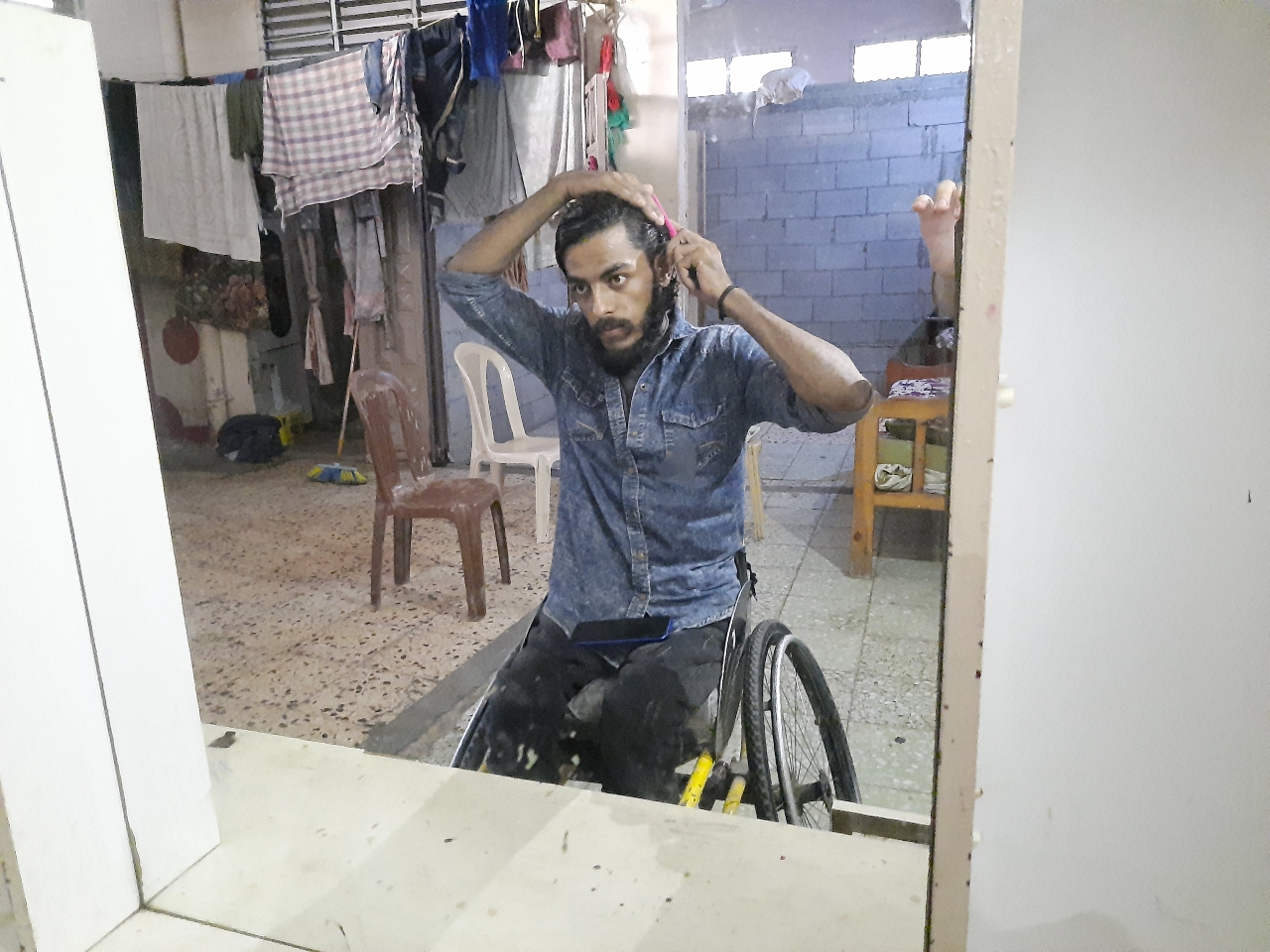
Warning: Some readers may find some of the content within this article disturbing
Soon after Israel launched its 11-day war on the Gaza Strip in May, Foad Abu Joba’s family, who live in al-Shujaiyya neighbourhood, east of Gaza City, fled to a nearby UN refugee agency (UNRWA) school to protect themselves from the falling shells.
The family wanted to avoid living through the same suffering they had endured during Israel's 51-day war on the besieged enclave in 2014.
“My family started collecting their things to go to the school at 7pm," Abu Joba, 29, who uses a wheelchair because of nerve damage in his legs, told Middle East Eye.
"I could not join them because I was suffering so much from my backache.
“I stayed that night alone at home. The next morning, while I was going alone to the school, the warplanes bombed a nearby graveyard.
"My wheelchair and I fell to the ground. My thigh was wounded from a glass fragment. I was wearing black trousers, so I did not see the blood until I reached the school."
With great difficulty, Abu Joba managed to get up again and continue his journey. He arrived 20 minutes later, his leg covered in blood.
Abu Joba was diagnosed with cartilage and spinal inflammation in 2006 and soon after, for no obvious reason, got hemiplegia, damaging the nerves in his leg.
“Because of my paralysis, I do not feel my legs, so I did not feel the bleeding," he said.
"My nephew rushed to the pharmacy to buy some sterile screens and iodine. Then I treated the wound. Fortunately, [it] healed quickly.”
'I was fed up with my life'
According to a report issued in May by The National Society for Rehabilitation, an NGO based in Gaza, Abu Joba is just one of 3,000 people with disabilities who had to flee to shelters in UN refugee agency schools during the latest Israeli bombardment of the beseiged enclave.
The conflict, which started on 10 May, began when Israel launched airstrikes across the Gaza Strip in retaliation for rockets fired by Palestinian armed groups.
Those rockets had been fired in response to an Israeli plan to evacuate Palestinians from their homes in the Sheikh Jarrah neighbourhood of East Jerusalem and attacks by Israeli forces on worshippers inside al-Aqsa Mosque.
Describing his experience when he arrived at the school, Abu Joba said: “The problem for me was that there are hundreds of people at the school, and my family could not find a classroom on the ground floor, so they had to go to one on the second floor.
'The only accessible toilet was closed, so I had to use the public ones used by hundreds every day'
- Foad Abu Joba
“My brothers and relatives put up a small tent for me in the school yard. I suffered every second I stayed there.
"Not to mention that neither the school administration nor any international organisations helped me. The only accessible toilet was closed, so I had to use the public ones used by hundreds every day.
"Most of the time, despite the dangers, I used to go home to take a shower and do other stuff. Finally, on the sixth day, I left the school and stayed at home with my nephew.
"I was fed up with my life at the school shelters. For me, I would have preferred to die at home rather than that suffering at the school.”
Broken wheelchair
Mohammed al-Amarin, who has cerebral palsy, relates to Abu Joba's suffering as he and his family, who live in the al-Zaytoun neighbourhood, east of Gaza city, also had to flee the Israeli attacks.
“When the war erupted, I was selling underwear and cheap golden accessories in the al-Nasser market in the middle of Gaza,” Amarin, who has a stand at a street market, told MEE.
“I put my goods inside a nearby shop and dashed home. Then my father, who also has a disability, told me it was safe and that we should stay at home for the first night.”
Amarin's family, which includes three people with disabilities, stayed three days at home, then had to flee as conditions worsened.
“At 6am, on 14 May, I called my neighbour to give us a ride to an UNRWA school to stay at until the war ends," he said.
"His car is small, so he just took my father, sister and mother. My wife, three children and I told them we would follow them.
“Around 10 minutes later, my wheelchair broke down in the middle of the road.”
As the bombing intensified and the roads began to empty, Amarin tried to fix it but was unable to, so he told his wife and children to go to the school ahead of him.
“Luckily, after some minutes, someone was fleeing to the same school with his family on a carriage and helped me get there,” he said.
Heavy blast
“My family and I went to stay in a classroom on the ground floor," said Amarin, who also suffers a problem with the nerves in his feet. "But we didn't have any mattresses or blankets to sleep on. So I sent my son to one of the shool's neighbours who gave him a blanket. I fell asleep as soon as I got it.”
'When the ceasefire came into effect I called a taxi driver to drive us home. I swear to God I couldn't spend one more night at the school'
- Mohammed Al-Amarin
After a few hours, a heavy blast nearby woke him up, but he couldn't move because his body was stiff and the humidity was giving him back pain.
He told the school administration that he needed a medical mattress and medicines such as Baclofen, Diclofenac and antibiotics for bone infections. However, they did not provide anything.
“After two days, my relative brought me a mattress and a pillow, but they were uncomfortable," said Amarin.
"My back was extremely stiff because of the mattress and pillow, and because I hadn't taken my medication for the six days we stayed at the school.
“When the ceasefire came into effect at 2am on 21 May, I called a taxi driver to drive us home. I swear to God I couldn't spend one more night at the school.
“Once I was home, I felt like I was in heaven.”
'Is Iyad with you?'
According to Al-Mezan Center for Human Rights, during the 11-day conflict, Israel killed 261 Palestinians, including 67 children, 41 women and five people with disabilities.
One of those who died was Iyad Salha, a 35-year-old man with paraplegia who was killed on 19 May with his 37-year-old pregnant wife, Amany, and his three-year-old daughter, Nagham, in their home in the Dair al-Balah camp, in the centre of the Gaza Strip.
“At 3pm, my three brothers, two sisters and I went to my married sister’s home, which is 10 minutes away from our home,” 32-year-old Omar, Iyad's brother, told MEE, recounting the day they died.
“Iyad and his wife and daughter stayed behind at home to have their lunch. Then, 20 minutes later, we heard a strong blast.”
Salha's cousin, who had seen them leaving their home earlier, called and asked him: “Is Iyad with you? Because your apartment was bombed and no one could reach it because of the fire.”
His mother shouted and cried, and all of them scrambled to see what had happened.
Family buried
After a quiet pause, his eyes brimming with tears, Omar slowly recounted the events of that day: “When we arrived, there were many ambulances and firefighters who were trying to extinguish the fire.
"When I entered our apartment, I saw three walls had collapsed onto the ground, and the smoke from the fire was suffocating.
Holding the remnants of Iyad’s wheelchair, he continued: “Then, I found his hands severed from his body. Nagham, his little daughter, was completely burnt, and Amany’s head was separated from her body, and her foetus was out of her womb.”
"I could barely open my eyes to look for my brother and his family.”
As he recounted the story, Omar went silent and cried again for a while.
“After some time, my uncles, brothers and I went to the hospital and signed a formal paper to receive their bodies to bury them. We buried them after Asr (afternoon) prayers,” he said.
“This attack was a dirty operation against a civilian disabled man sitting in his wheelchair among his family at his home,” Omar added furiously, “we want the world to help against the occupation.”
'Israel has hurt us too much'
Naji Naji, director of the Palestinian General Union of People with Disabilities in the Gaza Strip, told MEE that the suffering of people with disabilities in Gaza has increased as a result of their rising numbers and a lack of equipment.
He said the rise in numbers was due to successive Israeli wars against the enclave and attacks on Palestinians during the Great March of Return, protests in which Israeli forces fired upon and wounded hundreds of people.
“There was difficulty in providing aids, such as electric wheelchairs, crutches, medicines, medical headphones, batteries, and other stuff for those who evacuated their homes and stayed at UNRWA schools,” he said.
“People with disabilities suffered a lot during the war. For instance, many of them could not escape from a nearby bombardment because their movement was slow.
"Or they were unable to use the toilets at UNRWA schools.”
Naji appealed to the international community to immediately intervene to end Israeli violence against Palestinians.
"The Fourth Geneva Convention protects civilians during war, especially those with disabilities," lawyer Salah Abd al-Ati, director of the International Commission to support Palestinian People’s Rights, told MEE.
Additionally, the Convention on the Rights of Persons with Disabilities provides for the protection of people with disabilities during wars.
“The [Israeli] occupation’s crimes against people with disabilities during the wars may amount to war crimes. Luckily, an international commission was constituted to investigate these crimes.”
Back in al-Shujaiyya, Foad said: “Israel has hurt us too much. They are terrorists.
"Palestinians with disabilities have never hurt anyone. All I have to say is that Allah is the avenger.”
This article is available in French on Middle East Eye French edition.
Middle East Eye propose une couverture et une analyse indépendantes et incomparables du Moyen-Orient, de l’Afrique du Nord et d’autres régions du monde. Pour en savoir plus sur la reprise de ce contenu et les frais qui s’appliquent, veuillez remplir ce formulaire [en anglais]. Pour en savoir plus sur MEE, cliquez ici [en anglais].


